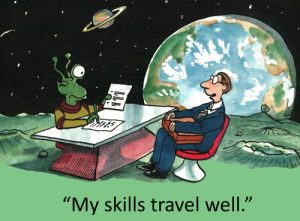My daughter is looking into graduate school. She’s not sure what she wants her future job to be and has been told by some to hold off graduate school until she decides. I disagree. As long as she has marketable skills, she will do well.
Growing up I wanted to be a medical doctor. That changed. Even after the change, I was convinced that I should be working towards a specific position or title. I realized that I probably wouldn’t work at the same company for life but I just “knew” I would have the same career my entire life. And that also changed. I have a degree in systems but didn’t always work in the IT department. I have been a financial analyst, business analyst, systems analyst, and project manager.
Past: Generalists not as desired
A lot of us have been told that we need to specialize and the more we know about our specialty, the more valued we have. The more valuable we are, the higher our salary and the more irreplaceable we are. This seems to be true and still can be true. Sometimes. For example, we all know medical doctors get paid really well and have a low unemployment rate. And those with a specialty, are paid even higher.
But in corporate America, have you known folks, perhaps co-workers, with certain specialized skills that has been laid off? I know I have. And I’ve noticed some of these same folks find it extremely difficult to find a new job. There’s often talk of retraining or careers that are now non existent. There’s been a change.
Change
The world is changing; it’s becoming more complex. And as the world becomes more complex, the economy changes. Then business has to change. Doing business becomes more complex as well.
And with this complexity, there needs to be a high level view to connect things together. There needs to be linking between the various complex components. There needs to be understanding of upstream and downstream impacts. Thought around what’s going on to the left and to the right.
There is so much uncertainty in our current times, we have no other choice but to look at the big picture, unless we want to be left behind. This applies to the self employed as well as employees within businesses.
And more importantly this applies to us entrepreneurs. Each day we take on various roles. Sometimes we are performing financial analysis. Sometimes we are writing copy to engage our target market. And sometimes we are making sure our customers are happy. We can’t afford to only work in one area of our company.
Now and Future: Being a generalist is an advantage
We still need specialists in certain areas, such as natural sciences. But as the business landscape changes into a more complex entity, the importance of generalists will increase. We are talking about the generalists that possess a good strong, set of transferable and translatable skills such as:
- Adaptability
- Communication, oral and written
- Analysis
- Decision making
- Creative thinking, problem solving
- Speaking
- Time-management
- Management, self and others
Honing your expertise is still a good idea, but dump the expert fear! Acquiring and developing transferable and translatable skills will give us each a head start in this changing, evolving economy. Let’s get to the point where we think in terms of skills and not departments. Let’s become generalists. It’s may not be easy. It will take intention, training, and practice but it will be worth it.
What do you say: which skill do you want to develop or acquire?

Leave a Reply